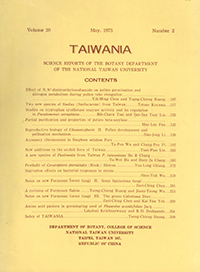Research Paper
Starvation Effects on Bacterial Responses to Stress
Shen-Yuh Wu
Published on: June 1975
Page: 179 - 200
DOI: 10.6165/tai.1975.20.179
Abstract
Microorganisms in aquatic environments are subject to nutrient starvation, which may influence sensitivity to a wide range of secondary stresses. A Gram-negative polar flagellated rod, isolated from a Colorado mountain stream, and a culture of Escherichia coli were starved in phosphate buffer to determine their responses to transient heating stress (52°C for 5 minutes) and the short-term presence of nutrients (glucose, peptone, acetate) under starvation conditions. These microorganisms and markedly different responses to starvation, secondary stress and nutrient presence. At the beginning of the starvation time, the water isolate was more sensitive to glucose presence, and was extremely sensitive to the secondary warming stress. These responses were markely diminished after a three-week starvation period, E. coli, under similar conditions, responded differently, in that with increasing starvation time it exhibited progressively greater sensitivity to the secondary stress. The differences in sensitivity to secondary stress and short-term nutrient availability showed by E. coli and this indigenous aquatic microorganism may reflect major physiological differences which lead to exclusion of E. coli from aquatic environments.


